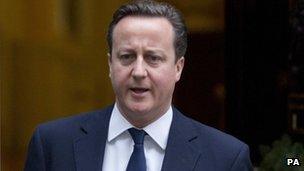What to expect in 2013?
- Published

As David Cameron and Nick Clegg put their feet up, nibble on a mince pie, and look back on the year past, they could be forgiven for thinking how glorious it has been.
The adoring crowds. The huge achievement. Britain punching above its weight.
A nation united in celebration of its leadership. But enough of the Jubilee and the Olympics. It is when our politicians think of their own record there might perhaps be less festive cheer.
For the prime minister, 2012 will be remembered for one word: omnishambles;
The Budget that kept on falling apart as planned tax rises were abandoned.
Nor will Mr Cameron remember with joy the Leveson Inquiry where we learned how he shared intimate texts - and a horse - with a tabloid editor.
It hasn't been much better for the deputy prime minister. He lost a Cabinet minister to an alleged traffic offence, he lost his plan to reform the House of Lords, and yes, he lost loads of elections.
His apology for raising tuition fees was mocked across the internet.
And as a coalition, on the only issue that matters, Messrs Cameron and Clegg have not done much better.
The economy has double dipped and the forecasts are grim. The small flicker of optimism is that they remain united on cutting the deficit.
And in the new year, the coalition will try to build on that unity by publishing a mid-term report, setting out their plans for transport, child care, youth unemployment and social care.
But as spring beckons that unity will be tested.
Having fallen out with the Tories over the budget, Lords reform, boundary changes, energy policy, the Leveson report, and drugs reform, the Lib Dems will now make a virtue of these differences.
The rows over secret courts and communications data will be fought on open ground. There will also be tensions as both parties try to agree the nation's budget for the first year of the next parliament, a spending review dominated by, well, less spending.
As for the Conservatives, there'll be continuing division over gay marriage but it is Europe that presents the toughest challenge. Mr Cameron will in January give a long-awaited speech in which he will promise a referendum on Britain's membership of the EU.
The risk is that he does not go far enough to satisfy his own party or those attracted to the UK Independence Party. UKIP have done well in elections this year as the new party of protest, regularly coming third in opinion polls ahead of the Lib Dems.
Their challenge now is to start turning that support into seats in Parliament and elsewhere.
Labour have had a reasonable year. They are ahead in the opinion polls, they took a seat off the Tories in a by-election and their leader Ed Miliband has shown growing confidence at the dispatch box.
And yet questions remain. The party's begun yet another policy review and it is still not entirely clear what Labour is offering voters on issues like education, health and, yes, the economy.
Some time soon the two Eds - Miliband and Balls - will have to set out what spending they intend to cut if they are to win trust on the economy.
North of the border, the battle for and against Scotland's independence will heat up. The polls for now are leaning against the SNP who've got into difficulties over an independent Scotland's relationship with the EU.
But there is a lot of time until the referendum in 2014 and opinion polls can change. So politics these days is fluid. Expect it to remain so in the year ahead.